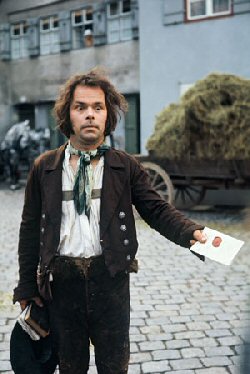I recently went back to watch Germany's most famous "non-actor" Bruno S. in an earlier performance than the one I wrote about in Stroszek. Chronologically speaking, I watched the two backwards in time, but I'm glad I saw them in the order I did. The Enigma of Kasper Hauser is the role Bruno S. was destined to play, but Stroszek is a film Herzog was destined to direct. (One of many!) Seeing Stoszek first is a better way to work into this classic Herzog double-feature; it is also a more natural build to the climax of the enigmatic Hauser character.
Hauser's story is very simply told, and according to German history, true. As a young man or perhaps a teenager, he was discovered standing freeze-frame in the town square in Nuremberg, 1828, a note in one hand and a hymn book in the other. He could barely walk, he couldn't speak, reason, eat, sit, anything -- he knew nothing, understood nothing, had been nowhere, had seen no one. The townspeople took him in, first the jailer and then others and he learned the language from children. As time went on he learned how to properly sit, properly eat, and properly function in a social setting. He got to the place where he could string words and then sentences together. A few years later he penned his story as he understood it.
The story he tells is something like this: from before he could remember, from the time he was a baby, he was held in a dungeon twenty-four hours a day -- no bath, no mirror, no contact with anyone, ever. A bowl of food was pushed in every day. He never knew to speak or spell because no one was there to teach him; he couldn't sit, stand or walk because he was chained in a crouching position. Grunting and playing with a small toy horse, he was kept there for years, a prisoner of no wrongdoing.
Looking back now you can understand Herzog's interest in the story at the beginning of his career: Hauser is a perplexing character whose origins remain a debated mystery -- Herzog, one of the more quizzical directors in history, has taken such license in telling his own story that we don't know what to believe about his origins, either. It is sheer enjoyment and just plain fun to go back and see Herzog's interest in enigmas even this early in his career.
Hauser was stabbed to death a few years after he began to speak. Such an action made his existence the stuff of conspiracy theories and German controversy. It is said that he came from royal blood, a bastard child that wouldn't be let near the throne. Others claimed he was a bum, a fraud with a novel idea and a way to be taken care of.
The film's original title is Every Man For Himself and God Against All. There is a point in Hauser's story when he asks why everything is so hard for him, a question even people raised in "normal" circumstances ponder. He is reminded of the progress he's made to that point and the people that want to help him succeed. "The people are like wolves to me!" he replies.
There is a naturally occurring phenomenon in the heart of man, that when he is beaten down by those he believes should stand tall and be better than they are, he'll perceive God in much the same light. The obstacle of the God relationship is like the sun eclipsed by wrongdoing. Kaspar Hauser had it worse than any of the rest, but in him our struggles are reflected.
Saturday, July 17, 2010
Subscribe to:
Post Comments (Atom)



Very good description of the movie, however I want to ask one thing. I remember learning about Kaspar Huser in school in biology, and it was something about some sort of psychological experiment which implied the isolation of an animal or human in order to distinguish his pre-defined instincts. Do you know something about this as well?
ReplyDeleteSorry for posting Anonymous:P
Hi Anonymous!
ReplyDeleteI don't remember any explanation in the film for why Hauser was imprisoned/isolated. I don't think one was given, but I've posed the question to my film community, and if you keep your eye on it and check back for a few days, someone there might have some insight I either missed or am unaware of.
The thread is Here:
http://ArtsAndFaith.com/index.php?showtopic=25393&view=findpost&p=251441
Thanks for stopping by Filmsweep!